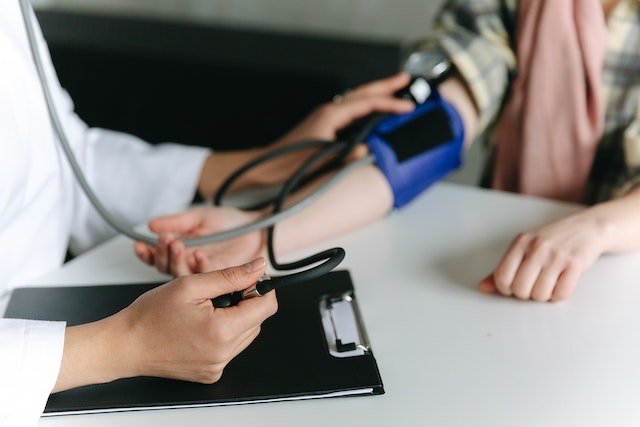CAUSES AND SYMPTOMS OF HIGH BLOOD PRESSURE
Force exerted by the blood on the arteries is called blood pressure. The oxygenated blood from the heart is carried by the arteries in the body. It is also called hypertension. If it is left untreated it may cause many health-related issues such as stroke, heart failure, kidneys problem, eye problems, etc. Usually, two readings are taken to measure blood pressure one is called systolic and the other is called diastolic. The systolic reading is taken during the contraction of the heart muscles while diastolic readings are taken during the expansion of muscles. Both the readings of a normal person should be below 80 and 120mmHg.
Those who are susceptible to high blood pressure:
Nearly 47% of Americans, according to the Centers for Disease Control and Prevention, have high blood pressure (CDC). High blood pressure can affect everyone, but certain factors can increase your risk of getting it. For example, ageing is a significant risk factor for high blood pressure. The CDC states that persons having age of 45 and older have a higher risk of developing high blood pressure than do adults younger than that age. As additional risk factors for high blood pressure, weight, sodium intake, and family history may all be present. If you have any of these risk factors, you should talk to your doctor about blood pressure control techniques. Taking precautions to lessen your risk will help you keep a healthy blood pressure level.
SYMPTOMS:
Many people with high blood pressure don’t exhibit symptoms, which is why it’s frequently referred to as the “silent killer,” claims Dr. Mitchell. You can still look for a few things that might be signs of high blood pressure. These include tension headaches, blurry vision, breathing difficulties, nosebleeds, and anxiety. If you frequently encounter any of these signs, you need to discuss getting your blood pressure checked with your doctor.
CAUSES
Fateness:-
High blood pressure can result from being overweight, which puts more strain on the heart and blood vessels. Arguably the biggest risk factor for hypertension is being overweight. Approximately 40% of US adults are fat at this time, while 70% of adults are either obese or overweight. Fat tissue releases a hormone called leptin into the bloodstream, which communicates with the hypothalamus, a part of the brain. Leptin levels rise in tandem with an increase in fat stores, signaling that the body has enough stored energy. According to a recent study done on mice, obesity-related elevations in leptin levels may also stimulate the formation of blood vessels in the hypothalamus, which in turn results in hypertension.
Lack of Exercise:
Lack of exercise can lead to weight gain. Weight gain raises the risk of developing high blood pressure. Inactive people frequently have greater heart rates. The arteries of persons who engage in physical activity remain clear so they have little chance of experiencing high blood pressure.

Poor Diet:
Consumption of food containing high quantities of salt, cholesterol, and fat may also cause high blood pressure.
Smoking:
The sudden and temporary increase in blood pressure is caused by smoking, vaping, or consuming tobacco. Smoking tobacco damages the blood vessel walls and hastens the artery hardening process. Ask your healthcare professional for advice on how to stop smoking if you currently do.
Deficiency of Potassium:
Salt homeostasis in the body’s cells is aided by potassium. Potassium levels must be correctly balanced for strong hearts. A deficiency of potassium may be caused by a diet low in minerals or by various medical disorders, such as dehydration.
Alcohol Consumption:
Alcohol has been the major cause of high blood pressure. Mostly this scenario has been observed in men.
Stress:
Stress may lead to hypertension. Behaviours resulting from stress such as smoking, eating more and drinking also cause high blood pressure.
Pregnancy:
Sometimes, elevated blood pressure during pregnancy occurs.
Age:
With growing age, people have more risk of having high blood pressure. Up until age 64, men are more likely than women to have high blood pressure. Women are more susceptible to high blood pressure after the age of 65.
Black Folk:
Black folks are more likely than other races to have high blood pressure. Compared to white individuals, black folks experience it sooner in life.
Hereditary Factors:
If either of your parents or a sibling has high blood pressure, you are more likely to get it yourself. For a variety of causes, high blood pressure frequently runs in families.
Blood relations frequently share many of the genes that can predispose a person to high blood pressure, heart disease, or stroke. The genetic building components known as genes are passed from parents to their offspring. Additionally, a family may engage in similar risk-raising habits including smoking, exercising, and eating.
COMPLICATIONS
Hypertension damages blood vessels and internal organs by exerting pressure on the artery walls. The harm increases as blood pressure rise and remains uncontrolled for a longer period.
Uncontrolled hypertension can result in issues like:
Stroke or Heart Failure
Heart failure, stroke, or other difficulties might result from the hardening and thickening of the arteries brought on by excessive blood pressure or other conditions.
Vision Loss:
High blood pressure can cause the blood vessels in the eyes to thicken, narrow, or tear. This may cause blindness.
Heart Failure:
During hypertension, it becomes difficult for the heart to pump blood. The walls of the pumping chamber of the heart get thicker due to the strain. The term “left ventricular hypertrophy” refers to this condition. The heart is unable to pump sufficient blood to the body as a result heart failure occurs.
Kidneys Infection:
The blood arteries in the kidneys may narrow or weaken as a result of high blood pressure. This might harm your kidneys.
Metabolic Syndrome:
This syndrome is a collection of metabolic abnormalities. It involves the erratic breakdown of sugar glucose. The syndrome is characterized by a larger waist circumference, elevated triglyceride levels, lower HDL cholesterol (the “good”), elevated blood pressure, and elevated blood sugar levels. The risk of developing stroke, Diabetes, and heart disease, also increases.
Effects On Memory And Cognition:
Uncontrolled high blood pressure can interfere with one’s capacity for thought, memory, and learning.
Aneurysm:
An aneurysm is a weakening and swelling of the blood vessel that develops as a result of high blood pressure. Aneurysm ruptures can be potentially fatal.
Dementia:
Narrow or blocked arteries can limit blood flow to the brain. Vascular dementia, a specific type of dementia, may result from this. Vascular dementia can also be brought on by a stroke that cuts off the brain’s blood supply.
Conclusion:
Different factors are responsible for high blood pressure like fatness, lack of exercise, poor diet, smoking , deficiency of potassium, age, alcohol consumption, stress, Pregnancy, age, black folk, hereditary factor etc. Its symptoms include tension headaches, blurry vision, breathing difficulties, nosebleeds, and anxiety. If it is left untreated it may cause complications such as stroke, heart failure, vision loss, kidney infection, metabolic syndrome and dementia.
AUTHOR INFORMATION:
Name: Sajeela Bibi
Education: Ms in Telecommunication Engineering















